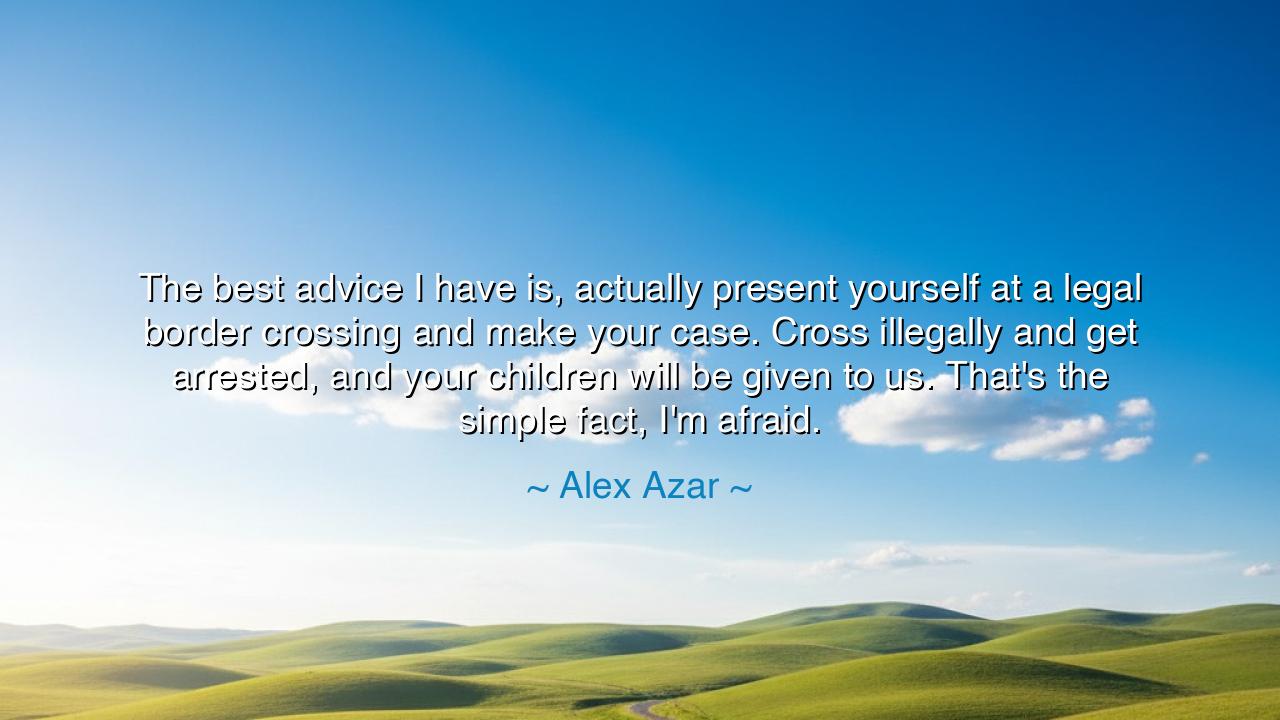
The best advice I have is, actually present yourself at a legal
The best advice I have is, actually present yourself at a legal border crossing and make your case. Cross illegally and get arrested, and your children will be given to us. That's the simple fact, I'm afraid.






“The best advice I have is, actually present yourself at a legal border crossing and make your case. Cross illegally and get arrested, and your children will be given to us. That's the simple fact, I'm afraid.” These words, spoken by Alex Azar, pierce like a blade of cold reality through the fog of compassion and law. They are not spoken in cruelty, but in the stern voice of order — a reminder that the world, though wide and filled with yearning hearts, is bound by law, by borders, and by the eternal struggle between mercy and justice. His words carry the weight of civilizations, for every nation that has ever existed has stood at the edge of this same tension: the longing of the traveler versus the duty of the gatekeeper.
To present oneself at a legal border crossing is to stand in the light of law and say, “I come not by force, but by plea.” It is the path of order, where one’s voice may be heard within the framework of justice. But to cross illegally, Azar warns, is to step outside that order, to enter the land not as a petitioner but as a trespasser — and in doing so, one awakens the machinery of enforcement, which does not know tenderness. The tragedy, then, is not only legal but human: for in that act, families are torn apart, and innocence suffers the cost of desperation.
This struggle is as ancient as the walls of cities. In the days of Jericho, gates were guarded and passages controlled, for even then the idea of sovereignty was sacred. The border has always been more than a line — it is a symbol of identity, a threshold between belonging and exile. Yet across history, there have always been those who fled over such lines, driven by hunger, war, or hope. In every age, law and mercy have wrestled — the wall rising on one side, and the human cry echoing on the other. Azar’s words dwell in this ancient conflict, the place where the heart and the state collide.
Consider the story of Ellis Island, where millions once arrived weary and poor, carrying all they owned in trembling hands. They came legally, waiting in endless lines, their fates decided by the stamp of an official’s hand. Some were welcomed; others were turned away. Yet even then, the process stood as a fragile balance — mercy structured by law. For without the structure, chaos would reign; without mercy, the law would harden into cruelty. The wisdom of Azar’s words lies in this balance: he does not speak to justify suffering, but to reveal that the path of order, however difficult, is the only one that prevents greater harm.
When he says, “That’s the simple fact, I’m afraid,” he reminds us that law is not emotion, but framework. It does not bend easily, for it was built to endure. Yet within its rigidity, we glimpse a truth: if one wishes to find safety, one must walk the path that justice allows, even when that path is long and harsh. For to break law is to enter the realm of consequences, and consequences — like the turning of seasons — cannot be denied.
But these words also call for reflection upon the lawmakers and the keepers of justice. For though the border must stand, its guardians must not forget compassion. The law, when wielded without humanity, becomes tyranny. The state, if deaf to suffering, loses its soul. Thus, the lesson cuts both ways: to those who seek entry, follow the rule of law; to those who guard the gates, temper justice with mercy. For the power to separate families, though legal, must always weigh heavy upon the conscience of the nation that wields it.
The teaching, then, is profound and double-edged. Respect the boundaries that hold society together, but never forget the human spirit that presses against them. If you are one who seeks refuge, do so with dignity and patience, even when hope trembles. If you are one who enforces law, do so with empathy, remembering that every face you see carries a story. The world’s borders may stand firm, but humanity must remain fluid — able to feel, to understand, to reform when the balance falters.
So, O listener, let Azar’s words be not merely heard, but pondered. They speak of the eternal dance between law and love, between order and compassion. A nation without law is chaos; a nation without mercy is stone. Walk the middle path — the path of reason, discipline, and empathy — and you will not only uphold justice, but preserve the heart that gives it meaning. For in the end, civilization endures not by walls alone, but by the wisdom with which it guards them.






AAdministratorAdministrator
Welcome, honored guests. Please leave a comment, we will respond soon